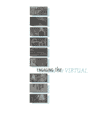
Whenever I’m in Toronto I try to get out to visit my dear friend Norman T. White, who lives a two-and-a-half hour drive northwest of the city (in summer… much further away in winter) in a converted grain mill known as the NorMill. The first time heard about The Mill was the first time I met Norman, in Halifax in 2000. We were in a show together at the Dalhousie Art Gallery – Engaging the Virtual, curated by Doug Porter – along with Doug back, Juan Geuer, Liwan, Jacques Perron, Catherine Richards, Bob Rogers and David Rokeby.
Here is a brief biography of Norman T. White: Norman is an artist. He builds robots, and he’s been at it for a long time. He had a chemistry set as a kid, that sort of thing. He built his first major electronic work, First Tighten Up on the Drums (1967-68) for a show called Some More Beginnings (Brooklyn Museum of Art, NY – 1969). And then – I’m skipping lots of stuff here – in 1978 he started teaching at the Ontario College of Art & Design. His courses in Digital Electronics, Computer Programming, and Mechanics for Real-Time Sculpture have had a massive impact on two or three generations of electronic artists; he and his students have shaped the landscape of new Media art in Canada today. Norman retired from OCAD in 2003. He still teaches similar courses at Ryerson and he still builds robots at The Mill.
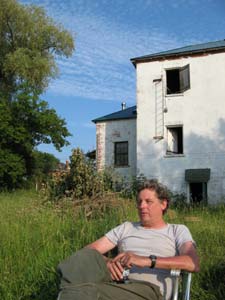
The first time I visited The Mill it was deep winter. It’s massive brick and stone building, pretty damn hard to heat. But the kitchen’s warm. And Norman’s one of my favourite people in the world to stay up late sitting at the kitchen table with, talking bottom-up thinking, telling tall tales, trading travel stories and pondering behaviours, human or otherwise. In Norman’s kitchen, hanging high up on one three-foot-thick brick wall is a neon sign, that I’ve never seen lit, that says: WE FIX TOASTERS. On Norman’s web site he explains:
I don’t really fix toasters, although I’d be proud if I could. Almost nobody fixes toasters. This is because a modern toaster is nearly impossible to fix, held together with little bendy tabs, which break off if you bend them more than twice. The toaster manufacturer naturally expects that you do the Right Thing — toss that dysfunctional item in the dump and buy a new one! All in all, the working toaster is a perfect symbol for modern utility in general… glamorous and efficient! Nevertheless, staring at this glamorous efficient high-resolution computer screen for hours at a time, you and I are both wrecking our eyes, not to mention our social lives. But, hey, I don’t mind… do you?
The first time Norman came and stayed with us in Montreal I was in the throes of a massive head cold and pretty pissed off about it. Barely able to carry on a conversation, I stumbled off to bed after dinner leaving Norman and Stéphane to fend for themselves. Many hours later I wandered out to use the bathroom and there they were, still at the table, deep into a conversation that I couldn’t have followed even if I didn’t have a fever – something about harmonic resonance and tonal frequencies or maybe it was harmonic frequencies and tonal resonance. Really, I have no idea.
Ever since we’ve been working to get Stéphane out to The Mill. Took us a few years, but finally we did it! We spent two days with Norm, talking our heads off about everything under the sun while sitting under the sun on the loading dock, on the dock by the river, at the kitchen table, up on the roof and all through the cavernous NorMill.
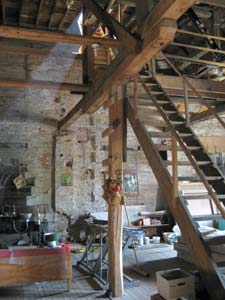
Norman’s a self-professed pack rat. The Mill’s on it’s way to becoming a museum of sorts. As it is it’s preferable to a Museum in the way a field of wild flowers is to a garden. Norm says:
Being attracted to obsolete tech, I collect computers which people have thrown out. Last time I counted, there were fifty-one vintage personal computers lying around, of various brands and working states. But that was a long time ago and I’ve stopped counting. Anyway, someday I hope to bring them all back to life in my NorMill Personal Computer Museum. For now I’ll just keep them in a big unheated room out back.
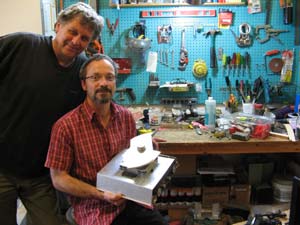
Norman T. White, Stéphane Vermette pose with Low Life (2003).
Special thanks to Sandor, a friend and former student of Norman’s, who overcame sudden car troubles to drive us to The Mill. Once we were there he jumped in the river with his clothes on four or five times, for reason’s that escape us, and then after dinner he explained how the dictionary works, which really was very helpful. Thanks Sandor!
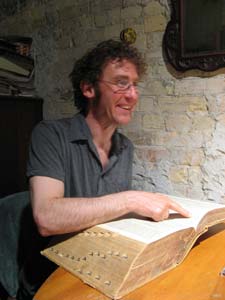
On the way home we detoured us through Norman’s favourite wind farm. This is old farming country. But the windmills seem to fit right in. Makes sense to me. Aside from through horses and guns, windmills and waterwheels are pretty much how the west was won. Finally! We make it back to square one. Don’t get me started on the Don Quixote theme. Let’s talk instead about reverse engineering. Yes, let’s. The next time we’re at the kitchen table at the NorMill.
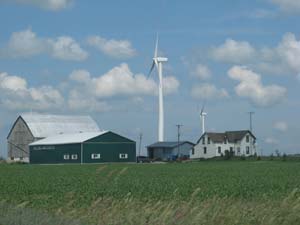
Visit The NorMill online: http://www.normill.ca/
. . . . .